虚拟语气在商务英语中的应用
虚拟语气的常见用法和形式
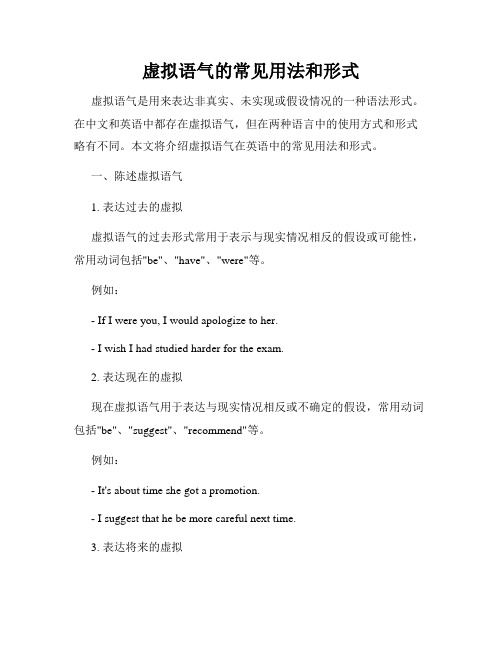
虚拟语气的常见用法和形式虚拟语气是用来表达非真实、未实现或假设情况的一种语法形式。
在中文和英语中都存在虚拟语气,但在两种语言中的使用方式和形式略有不同。
本文将介绍虚拟语气在英语中的常见用法和形式。
一、陈述虚拟语气1. 表达过去的虚拟虚拟语气的过去形式常用于表示与现实情况相反的假设或可能性,常用动词包括"be"、"have"、"were"等。
例如:- If I were you, I would apologize to her.- I wish I had studied harder for the exam.2. 表达现在的虚拟现在虚拟语气用于表达与现实情况相反或不确定的假设,常用动词包括"be"、"suggest"、"recommend"等。
例如:- It's about time she got a promotion.- I suggest that he be more careful next time.3. 表达将来的虚拟将来虚拟语气用于表达与现实情况相反或不可能实现的假设,常用动词包括"should"、"were to"等。
例如:- If I should win the lottery, I would buy a big house.- If it were to rain, the event would be canceled.二、命令虚拟语气当表示一种命令、建议或要求时,常使用虚拟语气来显得客气或委婉。
例如:- I suggest that you arrive on time for the meeting.- It's important that he be there for the ceremony.三、愿望虚拟语气愿望虚拟语气用于表达对过去、现在或将来的愿望、期望或希望。
(完整版)英语虚拟语气语法归纳总结
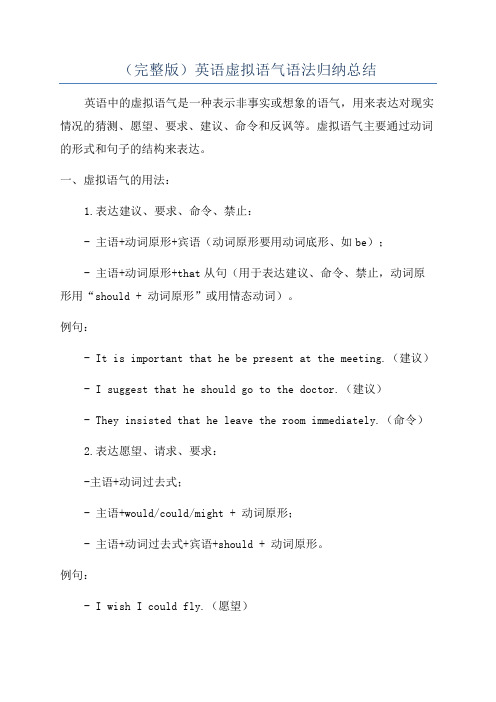
(完整版)英语虚拟语气语法归纳总结英语中的虚拟语气是一种表示非事实或想象的语气,用来表达对现实情况的猜测、愿望、要求、建议、命令和反讽等。
虚拟语气主要通过动词的形式和句子的结构来表达。
一、虚拟语气的用法:1.表达建议、要求、命令、禁止:- 主语+动词原形+宾语(动词原形要用动词底形、如be);- 主语+动词原形+that从句(用于表达建议、命令、禁止,动词原形用“should + 动词原形”或用情态动词)。
例句:- It is important that he be present at the meeting.(建议)- I suggest that he should go to the doctor.(建议)- They insisted that he leave the room immediately.(命令)2.表达愿望、请求、要求:-主语+动词过去式;- 主语+would/could/might + 动词原形;- 主语+动词过去式+宾语+should + 动词原形。
例句:- I wish I could fly.(愿望)- I would appreciate it if you could help me.(请求)3.表示虚拟条件:- If条件从句中的谓语动词用过去完成时,主句用would/should/might/could + have + 过去分词;- If条件从句中的谓语动词用过去时,主句用would/should/could + 动词原形。
例句:- If I had known his phone number, I would have called him.(虚拟条件)- If you had listened to me, we could have finished the project earlier.(虚拟条件)4.表达建议、要求、祝愿:- If only内部称述 + 主语 + 过去式。
虚拟语气的使用范围以及表达的几种形式
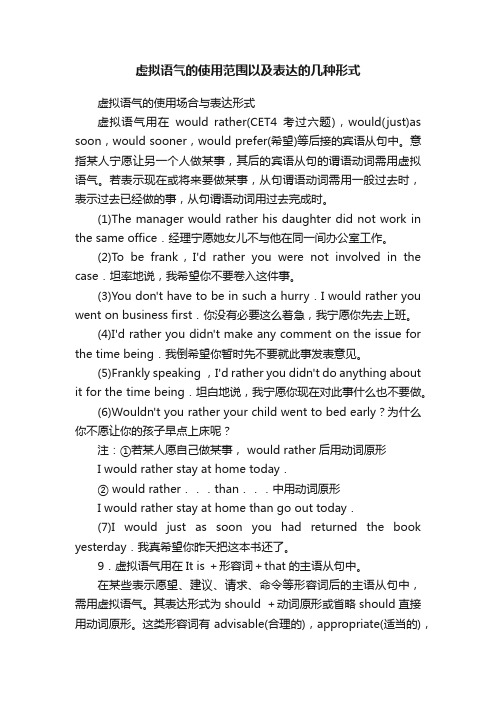
虚拟语气的使用范围以及表达的几种形式虚拟语气的使用场合与表达形式虚拟语气用在would rather(CET4考过六题),would(just)as soon,would sooner,would prefer(希望)等后接的宾语从句中。
意指某人宁愿让另一个人做某事,其后的宾语从句的谓语动词需用虚拟语气。
若表示现在或将来要做某事,从句谓语动词需用一般过去时,表示过去已经做的事,从句谓语动词用过去完成时。
(1)The manager would rather his daughter did not work in the same office.经理宁愿她女儿不与他在同一间办公室工作。
(2)To be frank,I'd rather you were not involved in the case.坦率地说,我希望你不要卷入这件事。
(3)You don't have to be in such a hurry.I would rather you went on business first.你没有必要这么着急,我宁愿你先去上班。
(4)I'd rather you didn't make any comment on the issue for the time being.我倒希望你暂时先不要就此事发表意见。
(5)Frankly speaking ,I'd rather you didn't do anything about it for the time being.坦白地说,我宁愿你现在对此事什么也不要做。
(6)Wouldn't you rather your child went to bed early?为什么你不愿让你的孩子早点上床呢?注:①若某人愿自己做某事, would rather后用动词原形I would rather stay at home today.② would rather...than...中用动词原形I would rather stay at home than go out today.(7)I would just as soon you had returned the book yesterday.我真希望你昨天把这本书还了。
英语中虚拟语气用法总结
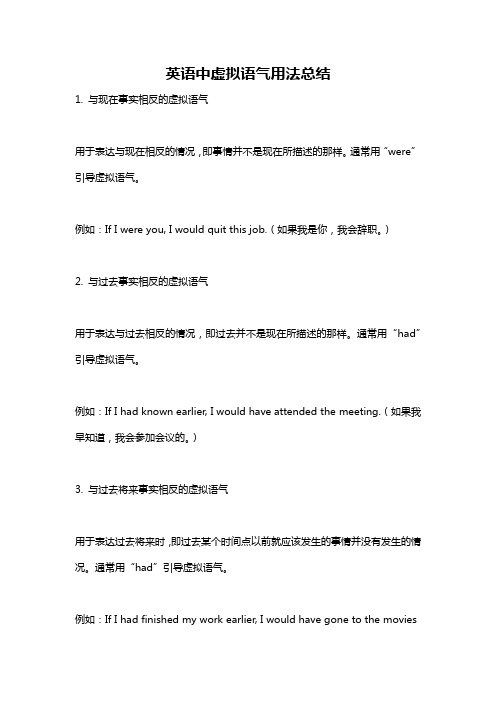
英语中虚拟语气用法总结1. 与现在事实相反的虚拟语气用于表达与现在相反的情况,即事情并不是现在所描述的那样。
通常用“were”引导虚拟语气。
例如:If I were you, I would quit this job.(如果我是你,我会辞职。
)2. 与过去事实相反的虚拟语气用于表达与过去相反的情况,即过去并不是现在所描述的那样。
通常用“had”引导虚拟语气。
例如:If I had known earlier, I would have attended the meeting.(如果我早知道,我会参加会议的。
)3. 与过去将来事实相反的虚拟语气用于表达过去将来时,即过去某个时间点以前就应该发生的事情并没有发生的情况。
通常用“had”引导虚拟语气。
例如:If I had finished my work earlier, I would have gone to the movieswith my friends.(如果我早点完成工作,我会和朋友去看电影的。
)4. 与现在将来可能性相反的虚拟语气用于表达现在将来的可能性,即可能会发生但不太可能的情况。
通常用“should”或“were to”引导虚拟语气。
例如:If I were to win the lottery, I would travel around the world.(如果我中了彩票,我会周游世界的。
)5. 与过去将来可能性相反的虚拟语气用于表达过去将来的可能性,即曾经可能会发生但最终却没发生的情况。
通常用“should”或“were to”引导虚拟语气。
例如:If I should fail the exam, I would have to retake it in three months.(如果我考试不及格,我就得三个月后再次参加考试。
)。
英语虚拟语气的运用
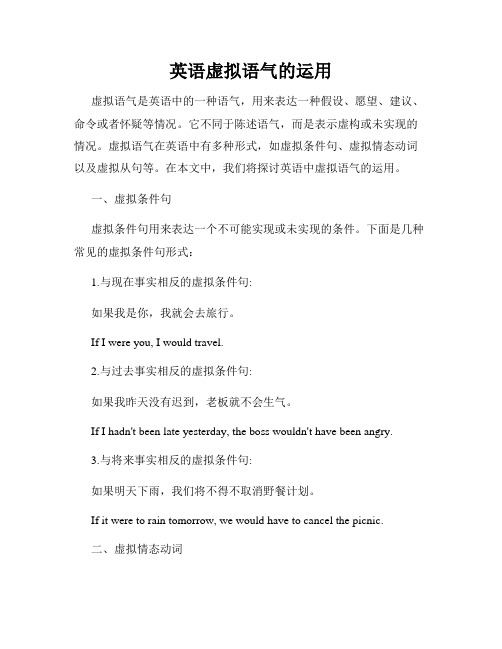
英语虚拟语气的运用虚拟语气是英语中的一种语气,用来表达一种假设、愿望、建议、命令或者怀疑等情况。
它不同于陈述语气,而是表示虚构或未实现的情况。
虚拟语气在英语中有多种形式,如虚拟条件句、虚拟情态动词以及虚拟从句等。
在本文中,我们将探讨英语中虚拟语气的运用。
一、虚拟条件句虚拟条件句用来表达一个不可能实现或未实现的条件。
下面是几种常见的虚拟条件句形式:1.与现在事实相反的虚拟条件句:如果我是你,我就会去旅行。
If I were you, I would travel.2.与过去事实相反的虚拟条件句:如果我昨天没有迟到,老板就不会生气。
If I hadn't been late yesterday, the boss wouldn't have been angry.3.与将来事实相反的虚拟条件句:如果明天下雨,我们将不得不取消野餐计划。
If it were to rain tomorrow, we would have to cancel the picnic.二、虚拟情态动词虚拟情态动词用来表示对现在或过去的一种假设、愿望或建议。
以下是几种典型的虚拟情态动词的应用:1. 用于对现在的虚拟假设:如果我会弹吉他,我会在聚会上表演。
If I could play the guitar, I would perform at the party.2. 用于对过去的虚拟假设:如果我有时间,我本来会帮你的。
If I had had the time, I would have helped you.3. 用于对现在的虚拟愿望:但愿我现在就能去旅行!I wish I could travel right now!4. 用于对过去的虚拟愿望:我希望我能参加那个聚会,但我当时太忙了。
I wish I could have attended the party, but I was too busy at the time.5. 用于对现在的虚拟建议:你应该早点睡觉,以免明天不舒服。
商务信函写作中的虚拟语气
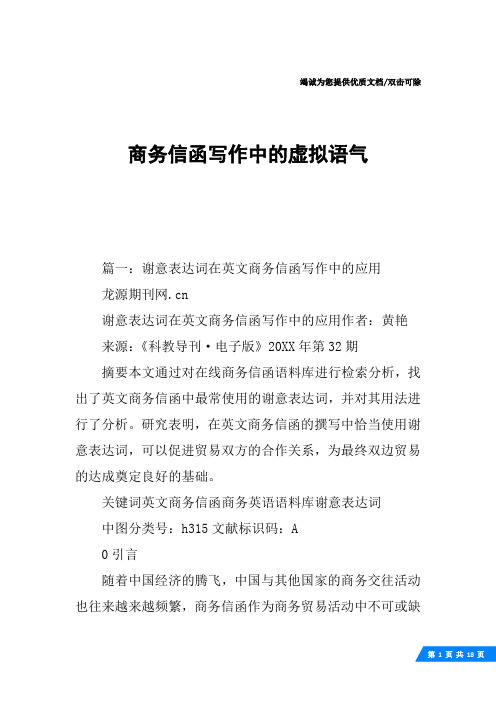
竭诚为您提供优质文档/双击可除商务信函写作中的虚拟语气篇一:谢意表达词在英文商务信函写作中的应用龙源期刊网.cn谢意表达词在英文商务信函写作中的应用作者:黄艳来源:《科教导刊·电子版》20XX年第32期摘要本文通过对在线商务信函语料库进行检索分析,找出了英文商务信函中最常使用的谢意表达词,并对其用法进行了分析。
研究表明,在英文商务信函的撰写中恰当使用谢意表达词,可以促进贸易双方的合作关系,为最终双边贸易的达成奠定良好的基础。
关键词英文商务信函商务英语语料库谢意表达词中图分类号:h315文献标识码:A0引言随着中国经济的腾飞,中国与其他国家的商务交往活动也往来越来越频繁,商务信函作为商务贸易活动中不可或缺的沟通媒介也越来越突显其重要性。
商务信函不仅仅是贸易双方书面的沟通媒介,同时,也是贸易双方开展贸易、建立良好合作关系的重要手段,撰写得体的商务信函在商务活动中对贸易双方能够起到至关重要的作用,笔者就谢意表达词在英文商务信函写作中的应用谈点浅见。
1研究方法、过程及结果本研究基于在线商务英语语料库,该语料库由日本学者Yasumasasomeya于2000年1月创立,之后经过不断完善更新,目前可检索的子语料库有27个,其中最主要的是商务信函语料库bLc(businessLettercorpus),包含1020XX0个字符,语料来源为英国和美国商务信函。
通过在语料库中用KwIc(Keywordincontext)方式进行检索,查找表示礼貌的各类谢意表达词“感谢或感激”在语料库中的分布情况,来判断何种谢意表达词是商务信函中使用频率较高的,并通过分析例句,帮助正确理解如何有效地使用高频率的谢意表达词来撰写坦诚友好又充满真诚谢意的商务信函,为英文商务信函写作教学提供一定的指导。
英文商务信函中表达谢意的词汇有动词“thank”及其变体形式“thanks”,“thankful”,“thankfully”,动词“appreciate”及其变体形式“appreciation”,“appreciative”,“appreciatively”,名词“gratitude”及其变体“grateful”,“gratefully”,另外还有动词“acknowledge”及其变体“acknowledgement”,形容词“obliged”、“indebted”等等,在撰写英文商务信函时,可酌情选择其中的词汇。
商务英语动词语气的用法
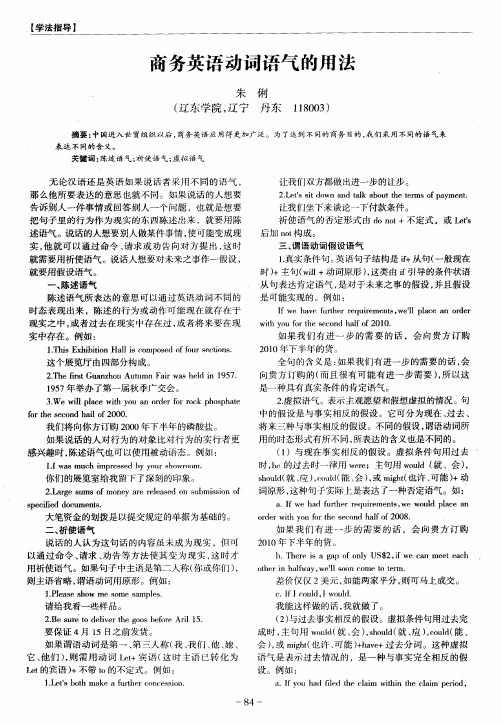
实 中存在 。例如 :
1ThsEx i io l i o o e ffu e t n . . i hb t n Hal sc mp s d o o rs ci s i o
这个展览厅 由四部分构成 。
2T e f s a z o t mn F i sh l n 1 5 .h rtGu n h u Au u arwa ed i 9 7. i
【 学法指导 】
商务英语 动词 语 气 的用 法
朱 俐
( 东 学 院 , 宁 丹 东 辽 辽
18 0 ) 1 0 3
摘 要 : 国进 入世 贸 组织 以后 , 务 英语 应 用得 更加 广 泛 。 为 了达 到 不 同 的商 务 目的 , 中 商 我们 采 用不 同的语 气 来
表 达 不 同的含 义 。
如 果我 们有 进 一 步的需 要 的话 ,会 向贵 方订 购
2l O O年下半年的货。
b T eei a gp o ny u ¥ , ec n metec . h r s a fo l s 2 i w a e ah f
15 9 7年举办 了第一届秋季广交会 。
3. e wilpa e wi o l od rfrr c h s h t W l lc t y u al r e o o k p o p ae h
o 1 e o d h i f2 00 frn es c n alo 0 .
I a e f rh r r q ie n s we1 p a e a r e f we h v u t e e u r me t . ’ c n o d r 1
wi o rte s c n a f2 0 t y u f h e o d h f o 01 . h o t
虚拟语气在英语应用文中的应用
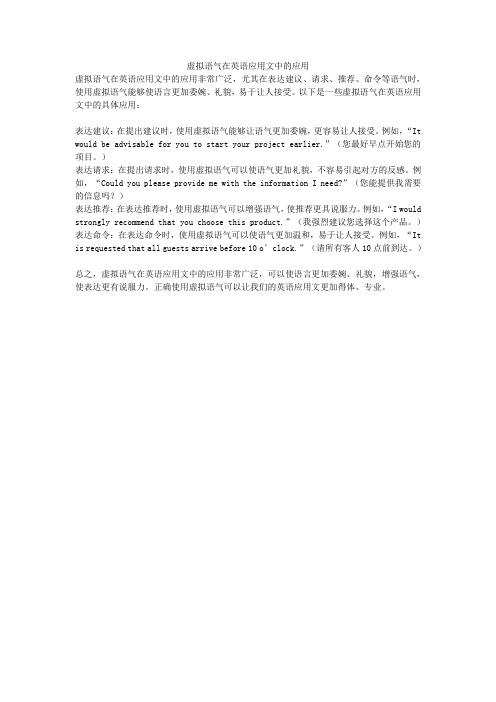
虚拟语气在英语应用文中的应用
虚拟语气在英语应用文中的应用非常广泛,尤其在表达建议、请求、推荐、命令等语气时,使用虚拟语气能够使语言更加委婉、礼貌,易于让人接受。
以下是一些虚拟语气在英语应用文中的具体应用:
表达建议:在提出建议时,使用虚拟语气能够让语气更加委婉,更容易让人接受。
例如,“It would be advisable for you to start your project earlier.”(您最好早点开始您的项目。
)
表达请求:在提出请求时,使用虚拟语气可以使语气更加礼貌,不容易引起对方的反感。
例如,“Could you please provide me with the information I need?”(您能提供我需要的信息吗?)
表达推荐:在表达推荐时,使用虚拟语气可以增强语气,使推荐更具说服力。
例如,“I would strongly recommend that you choose this product.”(我强烈建议您选择这个产品。
)表达命令:在表达命令时,使用虚拟语气可以使语气更加温和,易于让人接受。
例如,“It is requested that all guests arrive before 10 o’clock.”(请所有客人10点前到达。
)
总之,虚拟语气在英语应用文中的应用非常广泛,可以使语言更加委婉、礼貌,增强语气,使表达更有说服力。
正确使用虚拟语气可以让我们的英语应用文更加得体、专业。
商务英语中的委婉表达及其翻译
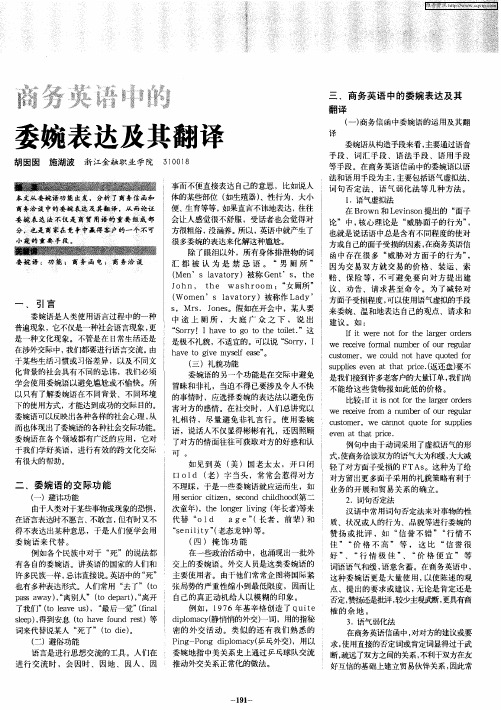
委婉语从构造手段来看 , 主要通过语音 手 段 、词汇手 段 、语法 手段 、语用 手段 等手段。在商务英语信 函中的委婉语以语 法和语用手段为主 , 主要包括语 气虚拟法、 词句否 定法 、语 气弱化法等 几种 方法 。 1 .语气 虚拟 法
பைடு நூலகம்
是我们接到许多老客户的大量订单 , 我们尚 不能给这 些货物报如此低 的价格 。
比较 : o rtel g rodr I ii n t o re res fts f h a
we rc i e fo a n mb r o u e u a e ev r m u e f O r g l r r c so e ,we c n o u t o u p i s u tm r a n t q o e f r s p le
一
、
引 言
( me Wo n’8 a a o y)被称作 La y’ l v t r d 8 ,Mr .J n s s o e 。假如在开会中,某人要 中 途 上 厕 所 , 大 庭 广 众 之 下 , 说 出
“o r S ry!Ih v o g o teti t”这 a et o t h o e. l
是极不礼貌 ,不适宜的。可以说 “ r o y,I S r
ha e t i e my ef e s ” v o g v s l a e 。
( )礼貌功能 三 委婉语 的另一个功能是在 交际中避免
sp l see tt a r e( 还 盘) 不 u p e vn a h tp c . i i 返 要
e e t t a rc . v n a h tp i e
英语中的虚拟语气的用法
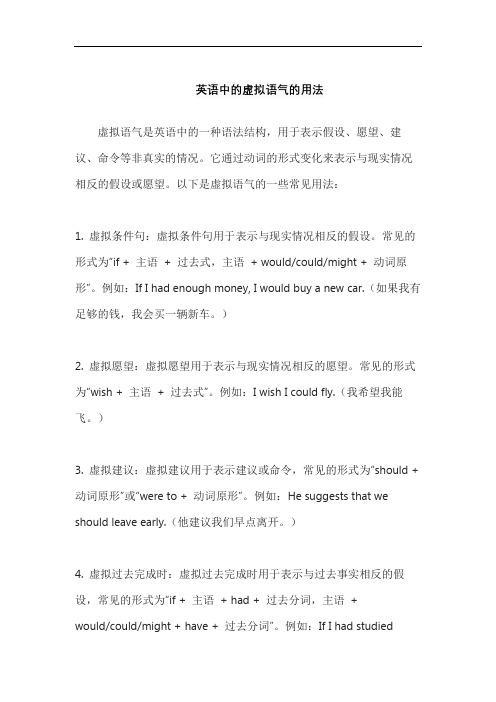
英语中的虚拟语气的用法虚拟语气是英语中的一种语法结构,用于表示假设、愿望、建议、命令等非真实的情况。
它通过动词的形式变化来表示与现实情况相反的假设或愿望。
以下是虚拟语气的一些常见用法:1. 虚拟条件句:虚拟条件句用于表示与现实情况相反的假设。
常见的形式为“if + 主语+ 过去式,主语+ would/could/might + 动词原形”。
例如:If I had enough money, I would buy a new car.(如果我有足够的钱,我会买一辆新车。
)2. 虚拟愿望:虚拟愿望用于表示与现实情况相反的愿望。
常见的形式为“wish + 主语+ 过去式”。
例如:I wish I could fly.(我希望我能飞。
)3. 虚拟建议:虚拟建议用于表示建议或命令,常见的形式为“should + 动词原形”或“were to + 动词原形”。
例如:He suggests that we should leave early.(他建议我们早点离开。
)4. 虚拟过去完成时:虚拟过去完成时用于表示与过去事实相反的假设,常见的形式为“if + 主语+ had + 过去分词,主语+would/could/might + have + 过去分词”。
例如:If I had studiedharder, I could have passed the exam.(如果我当时努力学习,我就能通过考试了。
)5. 虚拟语气在宾语从句中的用法:在某些动词后的宾语从句中,需要使用虚拟语气。
常见的动词包括“suggest”、“order”、“demand”等。
例如:He demanded that we should leave immediately.(他要求我们立即离开。
)虚拟语气在英语中有多种用法,需要根据具体语境和句子结构来选择适当的形式。
掌握虚拟语气的用法对于提高英语语法水平和表达能力至关重要。
虚拟语气在英语中的实际应用

虚拟语气在英语中的实际应用In 2023, the use of virtual mood in English has become more prevalent than ever before, playing an important role in daily communication. Virtual mood is a mood that expresses hypothetical situations or events that have not yet occurred. It is employed with the modal auxiliary verbs could, would, should, and might and is used in situations where speakers want to express a possibility, wish, or doubt.In the field of business, virtual mood is often employedin proposals and negotiations. For example, a salesperson may say, "If you were to purchase our product, you could experience significant cost savings." In this example, the virtual mood expresses a hypothetical situation in which the business chooses to buy the product, signaling the possible benefits of that decision.In the legal field, virtual mood is crucial in drafting contracts, where the use of virtual mood is employed toconvey the intended consequences of an action. For instance,an employment contract may employ the virtual mood by stating, "The employee would be required to fulfill their contractual obligations should they choose to accept the job offer." Inthis example, the use of the virtual mood expresses the condition under which the employee must fulfill theircontractual obligations, indicating what the consequences would be if they did not.In education, virtual mood can be used to denote hypothetical situations to help learners more easily understand complex concepts. For example, in a history class, a teacher may use virtual mood in the following statement: "If the Allied forces had lost the Battle of Stalingrad, the outcome of World War II could have been very different." In this example, the virtual mood provides a hypothetical scenario that highlights the significance of the battle, which is intended to motivate students to gain a deeper understanding of the event.In conclusion, virtual mood plays a vital role in English communication across a variety of fields, including business, law, and education. By expressing hypothetical situations or events that have not yet occurred, the virtual mood can facilitate greater understanding of complex concepts, aid in expressing possibilities and wishes, and highlight the intended consequences of actions. As such, the use of virtual mood promises to become increasingly important in the yearsto come.。
虚拟语气与商务英语表达

虚拟语气的构 成包括条件句、 虚拟条件句、 虚拟语气从句
等。
虚拟语气的分类
虚拟条件句:表示与事实相 反的情况,如would have done
假设条件句:表示假设的情 况,如if引导的从句
虚拟命令句:表示命令或建 议,如should do
虚拟条件句:表示与事实相 反的情况,如would have
PART 3
虚拟语气在商务英语中的应用
商务英语中虚拟语气的使用规则
虚拟语气用于表 示假设、条件、 愿望等
虚拟语气用于表 示建议、请求、 命令等
虚拟语气用于表 示可能性、可能 性等
虚拟语气用于表 示过去、现在、 未来的情况
商务英语中虚拟语气的表达方式
虚拟语气用于表 示假设、愿望、 建议等
虚拟语气的构成: if引导的条件句 +主句
使用虚拟语气要注意文化差异
虚拟语气在商务 英语中的使用频 率较高
不同文化背景的 人对虚拟语气的 理解和接受程度 不同
虚拟语气的使用 需要根据语境和 文化背景进行调 整
虚拟语气在商务 英语中的使用需 要注意礼貌和尊 重
P虚A拟R语T气6在商务英语中的发展
前景
商务英语中虚拟语气的发展趋势
虚拟语气在商务英语中的重要性日益凸显 虚拟语气在商务谈判、合同签订等场合的应用越来越广泛 虚拟语气在商务英语教学中的地位逐渐提高 虚拟语气在商务英语中的研究逐渐深入,出现了许多新的研究成果
done
虚拟语气的使用场合
假设条件:用于描述假设的情况,如"If I were you, I would..."
建议和劝告:用于提出建议或劝告,如"You should go to the doctor if you feel unwell."
英语词汇中的虚拟语气如何运用
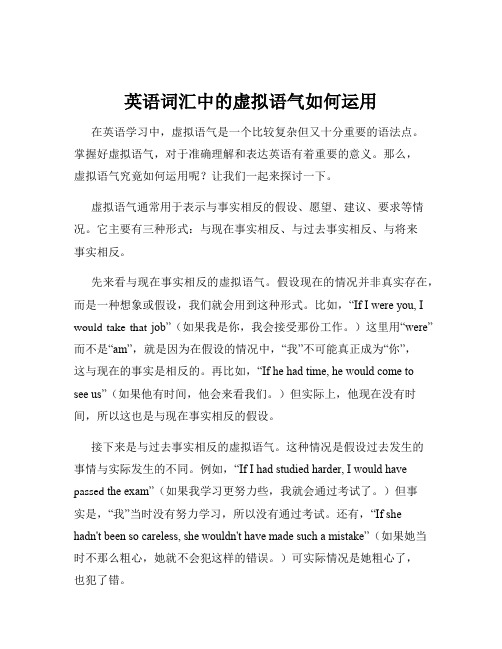
英语词汇中的虚拟语气如何运用在英语学习中,虚拟语气是一个比较复杂但又十分重要的语法点。
掌握好虚拟语气,对于准确理解和表达英语有着重要的意义。
那么,虚拟语气究竟如何运用呢?让我们一起来探讨一下。
虚拟语气通常用于表示与事实相反的假设、愿望、建议、要求等情况。
它主要有三种形式:与现在事实相反、与过去事实相反、与将来事实相反。
先来看与现在事实相反的虚拟语气。
假设现在的情况并非真实存在,而是一种想象或假设,我们就会用到这种形式。
比如,“If I were you, I would take that job”(如果我是你,我会接受那份工作。
)这里用“were”而不是“am”,就是因为在假设的情况中,“我”不可能真正成为“你”,这与现在的事实是相反的。
再比如,“If he had time, he would come to see us”(如果他有时间,他会来看我们。
)但实际上,他现在没有时间,所以这也是与现在事实相反的假设。
接下来是与过去事实相反的虚拟语气。
这种情况是假设过去发生的事情与实际发生的不同。
例如,“If I had studied harder, I would have passed the exam”(如果我学习更努力些,我就会通过考试了。
)但事实是,“我”当时没有努力学习,所以没有通过考试。
还有,“If shehadn't been so careless, she wouldn't have made such a mistake”(如果她当时不那么粗心,她就不会犯这样的错误。
)可实际情况是她粗心了,也犯了错。
然后是与将来事实相反的虚拟语气。
这通常用于表示对将来不太可能发生或实现的情况的假设。
比如说,“If it should rain tomorrow, we would s tay at home”(要是明天下雨,我们就待在家里。
)这里的“should rain”表示对将来下雨这一可能性的假设,但实际上明天是否下雨还不确定。
浅析虚拟语气在商务英语中的应用及翻译
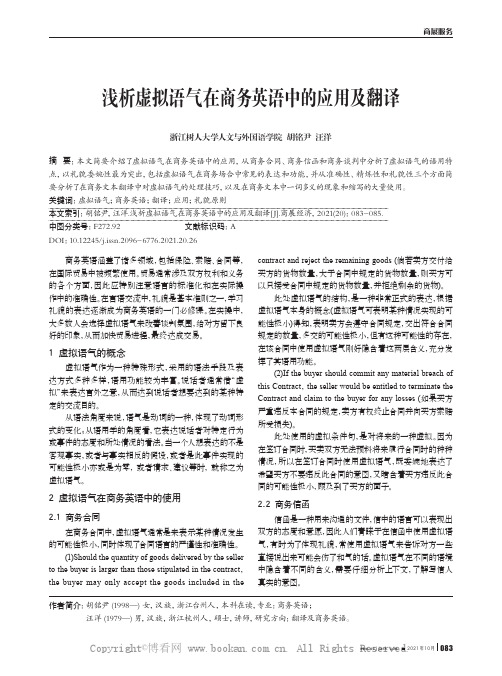
商展服务浅析虚拟语气在商务英语中的应用及翻译浙江树人大学人文与外国语学院 胡铭尹 汪洋摘 要:本文简要介绍了虚拟语气在商务英语中的应用,从商务合同、商务信函和商务谈判中分析了虚拟语气的语用特点,以礼貌委婉性最为突出,包括虚拟语气在商务场合中常见的表达和功能,并从准确性、精炼性和礼貌性三个方面简要分析了在商务文本翻译中对虚拟语气的处理技巧,以及在商务文本中一词多义的现象和缩写的大量使用。
关键词:虚拟语气;商务英语;翻译;应用;礼貌原则本文索引:胡铭尹,汪洋.浅析虚拟语气在商务英语中的应用及翻译[J].商展经济,2021(20):083-085.中图分类号:F272.92 文献标识码:ADOI:10.12245/j.issn.2096-6776.2021.20.26商务英语涵盖了诸多领域,包括保险、索赔、合同等,在国际贸易中被频繁使用。
贸易通常涉及双方权利和义务的各个方面,因此应特别注意语言的标准化和在实际操作中的准确性。
在言语交流中,礼貌是基本准则之一,学习礼貌的表达逐渐成为商务英语的一门必修课。
在实操中,大多数人会选择虚拟语气来改善谈判氛围,给对方留下良好的印象,从而加快贸易进程,最终达成交易。
1 虚拟语气的概念虚拟语气作为一种特殊形式,采用的语法手段及表达方式多种多样,语用功能较为丰富。
说话者通常借“虚拟”来表达言外之意,从而达到说话者想要达到的某种特定的交流目的。
从语法角度来说,语气是动词的一种,体现了动词形式的变化;从语用学的角度看,它表达说话者对特定行为或事件的态度和所处情况的看法。
当一个人想表达的不是客观事实,或者与事实相反的假设,或者是此事件实现的可能性极小亦或是为零,或者请求、建议等时,就称之为虚拟语气。
2 虚拟语气在商务英语中的使用2.1 商务合同在商务合同中,虚拟语气通常是来表示某种情况发生的可能性极小,同时体现了合同语言的严谨性和准确性。
(1)Should the quantity of goods delivered by the seller to the buyer is larger than those stipulated in the contract,the buyer may only accept the goods included in the contract and reject the remaining goods (倘若卖方交付给买方的货物数量,大于合同中规定的货物数量,则买方可以只接受合同中规定的货物数量,并拒绝剩余的货物)。
虚拟语气在商务英语中的应用
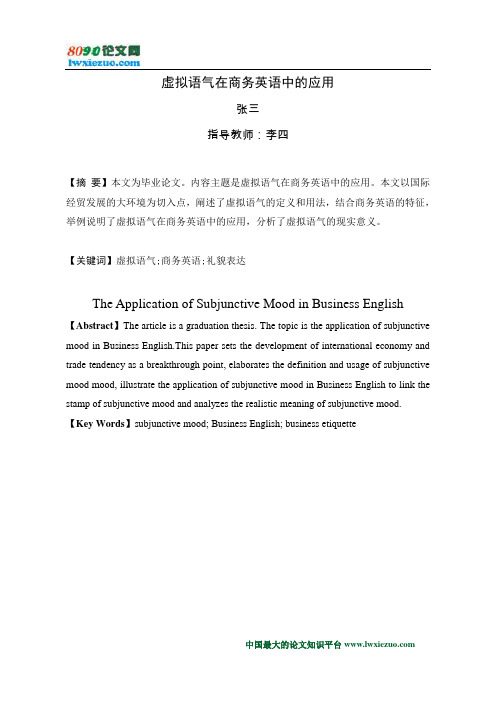
虚拟语气在商务英语中的应用张三指导教师:李四【摘要】本文为毕业论文。
内容主题是虚拟语气在商务英语中的应用。
本文以国际经贸发展的大环境为切入点,阐述了虚拟语气的定义和用法,结合商务英语的特征,举例说明了虚拟语气在商务英语中的应用,分析了虚拟语气的现实意义。
【关键词】虚拟语气;商务英语;礼貌表达The Application of Subjunctive Mood in Business English 【Abstract】The article is a graduation thesis. The topic is the application of subjunctive mood in Business English.This paper sets the development of international economy and trade tendency as a breakthrough point, elaborates the definition and usage of subjunctive mood mood, illustrate the application of subjunctive mood in Business English to link the stamp of subjunctive mood and analyzes the realistic meaning of subjunctive mood.【Key Words】subjunctive mood; Business English; business etiquette引言本人毕业论文课题是论虚拟语气在商务英语中的应用。
课题来源于商务英语中虚拟语气应用引发的相关问题的思考,结合商务英语的特点对虚拟语气的应用进行阐述。
商务英语是现代英语的一个重要组成部分,是国际商业社会的通用语言,它的发展趋势和主要特点在商务英语中得到充分的体现。
有关于虚拟语气在商务英语中的应用.doc

有关于虚拟语气在商务英语中的应用有关于虚拟语气在商务英语中的应用导读:【摘要】本文以国际经贸迅猛发展的大环境为切入点,阐述了虚拟语气的定义和用法,并结合商务英语的特征,举例说明了虚拟语气在商务英语中的应用,分析了虚拟语气的现实作用。
【关键词】虚拟语气商务英语1.虚拟语气概述语气是一种动词形式,表示说话人对某一行为或事情的看法或态度。
英语中有陈述语气,祈使语气和虚拟语气三种。
其中,虚拟语气表示说话人的主观愿望或假想,而不表示客观存在的事实,所说的是一个条件,不一定是事实,或与事实相反。
虚拟语气通过谓语动词的特殊形式来表示。
如:If I free”来表示,说明自己在将来肯定有空,而上述例子中,if从句用,表明这种情况是不可能出现的,从而表达一种遗憾或抱歉的语气。
2.商务英语的特点商务英语是指人们在商务、贸易往来中使用的英语文体,它与英语的其他具体形式,如科技英语、新闻英语没有什么本质的区别。
除了一些经贸专用词汇的术语,商务英语同日常所用英语的词汇大多相同,也没有自己独立的语法规则。
商务英语使用的是英语的基本词汇和语法规则,所不同的只是在英语的词汇系统及语法规则的基础上有所转变,从而形成了某些独特的商务英语的语言风格特点。
商务英语的语言正式、精炼,用词严谨、正规,词意准确商务英语所用语言比较正规,常有一定的格式和套话。
商务英语内容缜密、周到,结构复杂、意思完整。
由于商务活动涉及到双方或几方面的利益,商务合同、文件或条约所给的定义、条款和内容必须精确。
为了做到准确无误,不产生任何差异,用英语拟订、书写这些文件、合同时,除用词恰当外,还会用许多从句、短语用来修饰或限定其内容,因此结构复杂、句子冗长。
3.虚拟语气在商务英语中的应用3.1虚拟语气在询盘、报价中的应用询盘,是指交易的一方准备购买或某种商品,向对方询问买卖该商品的有关交易条件。
如:If it a number of our customers,ake some alloarket. 在以上例句中,由于动词采用了虚拟语气的形式,使商务洽谈双方无论是观点的陈述、要求的提出、价格的确定等的语气大为和缓,避开过于肯定绝对,具有更多的协商的余地,有利于业务的开展和贸易关系的确立。
虚拟语气在外贸函电中的应用
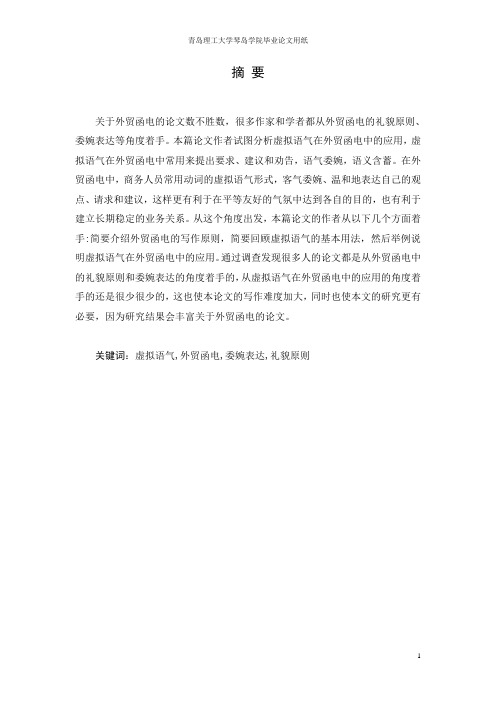
摘要关于外贸函电的论文数不胜数,很多作家和学者都从外贸函电的礼貌原则、委婉表达等角度着手。
本篇论文作者试图分析虚拟语气在外贸函电中的应用,虚拟语气在外贸函电中常用来提出要求、建议和劝告,语气委婉,语义含蓄。
在外贸函电中,商务人员常用动词的虚拟语气形式,客气委婉、温和地表达自己的观点、请求和建议,这样更有利于在平等友好的气氛中达到各自的目的,也有利于建立长期稳定的业务关系。
从这个角度出发,本篇论文的作者从以下几个方面着手:简要介绍外贸函电的写作原则,简要回顾虚拟语气的基本用法,然后举例说明虚拟语气在外贸函电中的应用。
通过调查发现很多人的论文都是从外贸函电中的礼貌原则和委婉表达的角度着手的,从虚拟语气在外贸函电中的应用的角度着手的还是很少很少的,这也使本论文的写作难度加大,同时也使本文的研究更有必要,因为研究结果会丰富关于外贸函电的论文。
关键词:虚拟语气,外贸函电,委婉表达,礼貌原则ABSTRACTThere have been tons of written theses concerning politeness principle in English correspondence. The author of the present thesis attempts to analyze the usage of subjunctive mood in English correspondence subjunctive mood is used to forward request, advice and suggestion. In English business correspondence, businessmen use subjunctive mood to express their opinion, request and suggestion. It helps to establish their long partnership and arrive at their aims on the equal foundation. From this point, the present author chooses several aspects such as the writing principals of English business correspondence, the basic usage of subjunctive mood and the usage of subjunctive mood in English business correspondence and so on.Through the study the author of the present thesis finds that there is almost no thesis about the usage of subjunctive mood in English business correspondence, which makes the study very necessary, because the study can rich the topic and content of theses about English business correspondence.Moreover, the conclusion of this thesis may hopefully be of some help to businessmen in their foreign trade activities.KEY WORDS: subjunctive mood, English business correspondence, euphemism, politeness principleIntroductionWith the development of technology, business correspondence is experiencing a rebirth. In order to save time and cut expense, thousands upon thousands of business communications were conducted through cable or telex before, and are now being sent by fax or e-mail. In this case, mastering the skills of writing an effective business letter in short time has become an emergence for those who want to represent themselves positively to their customers, competitors and employers. However, composing a good business letter is not a piece of cake for those who lack of basic information of business letter, especially English.Business letters are used in business transactions in order to promote international trade relationship and to transform information as a form of organizing communication with the outside world. Business letters have great deal of usages, such as inquiring information, giving a reply, offering, negotiating and adjusting, ordering goods, selling products, proposing ideas and building good will. Business letters are the written way for the both sides to do business, after reaching agreement about the conditions and terms, or we can say a deal is made. If there are some discrepancies in the following steps, it is necessary to check the exchanged business letters so as to seek to legal evidence. Therefore, business letters are legal documents in foreign trade. Nowadays, we can exchange information not only by paper letter, but also by E-mails fax. However, no matter what have happened, the function of writing an effective business letter and maintaining a sound relationship with the customers is all alike.As far as concerned, doing business is a kind of cooperation with the other party, so the two parties should trust each other and be willing to communicate with each other and conquer difficulties as much as they can. Their trust and cooperation attitude between the writer the reader will definitely be shown in business writing. Business letters are indispensable to business communication, specially, "a piece of conversation by post",(Gan Hong,1979); it is special kind of communication.Classification of business lettersBusiness letters can be classified from various perspectives. The most prevailing ways of classification are as followed:1)Classification according to the content of the letter. The following are among the most frequent in use: request letters, letters answering requests, claim and adjustments letters, credit and collection letters, sales letters, employment letters and social business letter, etc.(Stewart, 1984:380-381)2)Classification according to the different functions in the process of a business transaction. Business letters may be used in every phase of business activities. There are letters for establishing business relations, letters for the inquiry of business. There are quotation letters, negotiating letters, ordering letters, confirming-order letters, payment letters, shipment and insurance letters, acknowledging goods receipt letters, claim letters and adjust letters, ect.(Shi Ruifen,1993).3)Classification by the nature of the information given. Stewart(1984:382) summed up four different kinds of information in term of its effect on the reader's needs: good-news, neutral-news letters, bad-news letters and persuasive letters. Good news letters and neutral news letters together are called everyday letters.Business letters are of too various types for us to make a complete and perfect classification in this thesis. Furthermore, it is inevitable that there is an overlap between some types of letters suggested above, sometimes it is difficult to distinguish one kind of letters from another.Additionally, there are few differences among letters, faxes and E-mails regard to writing. The only difference is that the transmitting means is different. Therefore, in this thesis, we will never distinguish letters from faxes and E-mails.Chapter One Writing Principles of Business LettersBusiness English is widely used in various international correspondence, business negotiation, contract, agreements, document and so on. However there remains a problem-how to adopt some pragmatic skills and make full use of the English expressive methods and skills so as to make the business activities proceed smoothly and lead to what is expected. This chapter analyses the writing principles of the English business correspondence.1.2 The writing principles of the English correspondence1.2.1 CourtesyCourtesy is not mere politeness. It stems from a sincere You-attitude.Compare:(Polite)We have received with many thanks your letter of Oct 7, and we take the pleasure of sending you our latest catalog. We wish to draw your attention to a special offer which we have made in it.(Courteous)You will be particularly interested in a special offer on page 5 of the latest catalog enclosed, which you requested in your letter of Oct 7.In order to make a business letter courteous, try to avoid irritating, offensive, or belittling statements. To answer letters promptly is also a matter of courtesy.1.2.2 ConsiderationConsideration emphasizes You-attitude rather than We-attitude. When writing a letter, keep the reader’s request, desires, as well as his feelings in mind. Plan the best way to present the message for the reader to receive.The following points are necessary for writing a letter to embody consideration:a. You-attitudeCompare:We-attitudeWe allow 2 percent discount for cash paymentYou-attitudeYou earn 2 percent discount when you pay cash.b. Focus on the positive approachCompare:(Positive)We feel sure that you will be entirely satisfied.(Negative)We don’t believe you will have any cause for dissatisfaction.1.2.3 CompletenessA business letter should include all the necessary information. It is essential to check the message carefully before it is sent out.1.2.4 ClarityThe writer must try to express his meaning clearly so that the reader will understand it well. To achieve this, he should try to:Avoid using the words which have different understanding or unclear meaning.e.g. As to the steamers sailing from Hong Kong to San Francisco, we have bimonthly direct.The word “bimonthly” has two meanings: twice a month, or once two months. T The reader will feel puzzled about the meaning.(Rewriting):a. We have two direct sailings every month from Hong Kong to San Francisco.b. We have semimonthly direct sailing from Hong Kong to San Francisco.c. We have a direct sailing from Hong Kong to San Francisco every two months.Pay attention to the position of the modifiers.e.g. a. We shall be able to supply 10 cases of the item only.b. We shall be able to supply 10 cases only of the item.The modifier “only” in the above sentences modifies two different words, so the two sentences have different meaning.Pay attention to the sentenceCompare:e.g. a. We sent you 5 samples yesterday of the goods which you requested in your letter of May 25 by air.b. We sent you, by air, 5 samples of the goods which you requested in your letter of May 25 yesterday.Paragraph carefully and properly.Commercial letters should be clear and tidy, and the content, easy to understand. So a writer should paragraph a letter carefully and properly. One paragraph for each point is a good general rule.1.2.5 ConcisenessTo achieve conciseness is to use concise sentences and fewest words, without losing completeness and courtesy, to explain the making a letter clearly.The following are the methods of making a letter concise:Avoid using wordy expressions.Wordy: Enclosed herewith please find two copies of…Concise: We enclose two copies of…Avoid unnecessary repetition.Will you ship us any time during the month of December, or even November if you are rushed, for November would suit us just as well.(Rewriting)Please ship us by the end of November.Use short sentences, simple words and clear explanations.a. Use a word to replace a phrase.enclosed herewith encloseda draft in the mount of US $ 1,000 a draft for US $ 1,000b. Use a phrase replace a sentence.Please see that an enquiry is conducted to determine the reason.Please find out the reason.c. Use words to replace clauses.We require a full-automatic washing machine which is of the new type.We require a new-type full-automatic washing machine.1.2.6 ConcretenessMake the message specific, definite and vivid.1.2.7 CorrectnessCorrectness refers not only to correct usage of grammar, punctuation and spelling, but also to standard language, proper statement, accurate figures as well as the correct understanding of commercial jargons.Business letter acts as a special means of written communication between the two parties who may have different cultures, which should be pay special attention to. It is indispensable for both side to choose effective writing strategies and languages in gaining advantages over others. By resorting to the politeness strategies in different context, we can reveal the significance pragmatics of politeness. A polite and courtesy letter can help to make the trade go on smoothly, while a letter without politeness can not only lead to the failure of the business but also destroy the image which the company had built up. Thus, an appropriate language is totally necessary.The author of this thesis also thinks that the first principle "courtesy" is the most important one in the English business correspondence writing, and the publication of relevant works on politeness fully demonstrates the vital importance of politeness and its strategies in social interactions, because the English correspondences are goal-oriented and they take place in specific situations and they aims to build the image of the communicator as well as the company he or she represents.when a reason is presented politely, the negative message is more likely to be accepted by the reader.Chapter Two the Subjunctive Mood2.1 The definition of the subjunctive moodMood is a set of contrasts which are often shown by the form of the verb and which express the speaker or writer's attitude to what is said or written. Three moods have often been distinguished---the indicative mood, the subjunctive mood and the imperative mood. The indicative mood is used in statements (either affirmative or negative) of facts, in questions of facts and in exclamations of facts. The subjunctive mood refers to the speaker's thought instead of facts. It expresses wishes, suggestions, and suppositions, while the imperative mood conveys the speaker's will to urge the person addressed to fulfill an action and is expressed in the form of a command, a request, a warning, etc.Subjunctive mood, which has been active in the English language for many centuries, is one of the necessary grammatical categories of the English language. Subjunctive mood refers to the speaker's thought instead of facts. It expresses wishes, suggestions, and suppositions. The subjunctive mood is the form of a verb which i ndicates that the speaker's words are not objective fact, but only a subjective wish, an assumption, an unreal suspicion or a suggestion.e.g. I wish I were as young as you.If there were no subjunctive mood, English would be much easier to learn.I'm not their servant, but sometimes they treat me as if I were their servant.The doctor suggested that he try to give up smoking.2.2 The forms and the types of the subjunctive moodThe subjunctive mood of the English language is divided into two forms: the present and the past subjunctive mood. But these two forms are inadequate for including all the subjunctive mood forms, because they are not inclusive enough to account for all the seven types of the verb forms in subjunctive sentences as exemplified below:1. be-subjunctive2. were-subjunctive3. had-been- subjunctive4. should-be subjunctive5. should-have-been-subjunctive6. should/would-be-subjunctive7. should/would-have-done- subjunctive.According to the concepts of the speaker's willing, the writer of this paper considers it more reasonable to break the subjunctive mood into the following six types regarding:1. in the unreal conditional sentences,2. expressing wishes, desires, etc.,3. expressing suggestion, command, request, etc.,4. expressing surprise, strangeness, pity, doubt, disappoint, etc.,5. expressing delicacy or politeness,6. in the adverbial clauses of concession, comparison and purpose2.3 Analysis of the usage of the subjunctive mood2.3.1 The subjunctive mood used in adverbial clause of conditions with “if”Form of the verb in conditional clause Form of the verb in principal clauseContrary to the fact of the present The past tense(be-were)Would+ verb stemContrary to the factof the pastHad+ past participle Would+ have+ past participleContrary to the fact of the future A: usual form: the pasttense(be-were)B: less possibility: were+to+ verb stemC: more possibility:should+ verb stemWould+ verb steme.g.If I had time, I would certainly go to the movies with you.He would not feel so cold if he were indoors.If the earthquake had happened at night, more people would have been killed.If you had told me earlier, I would not have signed that contract.If it snowed tomorrow, I would stay at home.If she were to marry Jack, she would be happy.If she should know it, she would tell me.Notice:1. The word “would”in the principle clause sometimes can be replaced by should”, ”could” or “might” according to the person of its subject and the mood of the speaker.e.g. If he had come yesterday, I should have told him about it.If I had wings, I could fly all over the world.If we had made preparations, we might have succeeded.3.In written English, if there is the word “were”, “had”or “should”in the unreal conditional, the introductory word “if” can be left out and “were”, “had” or “should”should be put in front of the subject to form an inversion structure.e.g. If he were indoors, he would not feel so cold-Were he indoors, he would not feel so cold.If the earthquake had happened at night, more people would have been killed.-Had the earthquake had happened at night, more people would have been killed.If I should have time, I would call on her.-Should I have time, I would call on her.3. Fixed expressions: “If it were not for…” and “If it had not been for…”e.g. If it were not for the rain, the crops would become withered.If it had not been for your help, I would have gone bankrupt.2.2 unreal conditionals of mixed timeWhen the time of the conditional and the time of the principal are different from each other, the forms of the subjective mood should be adjusted according to their respective time.e.g. If I had taken the umbrella with me this morning, I would not be wet now.( the present—the present)If I were you, I would not have missed the film last night.( the present—the past)If they had left home early this morning, they would arrive in half an hour.( the past—the future)2.3 sentence with implied conditionsIn English, there are some sentences with implied conditions. If the condition is unreal, the predicate verb of the sentence should use the form of the subjunctive mood.e.g. But for your help, we could not have succeeded.(=If it had not been for your help, we could not have succeeded.)They would not have reached the agreement so easily without that common ground. (=They would not have reached the agreement so easily if it had not been for that common ground.)She drove so fast. Otherwise she would not have had the car accident.(=If she had not driven so fast, she would not have had the car accident.)3 subjunctive mood used in object clausesForm of the verb in object clauseThe past tense (be-were)Wish that is contrary to the fact of thepresentWish that is contrary to the fact of theHad+ past participlepastWould/could/should/might+ verb stem Wish that is not likely to come true in thefuturee.g. I wish she were here now.I wish she had taken my advice last time.I wish you would go with us tomorrow.3.2 The object clause following the verb “suggest”, “order”, “demand”, etc.In the object clause following the verbs “suggest”, “advise”, “propose”, “order”, “command”, “demand”, “require”, “request”, “desire”, “insist”, “promise”, “urge”, “decide”, “ask”, etc., the predicate verbs in the object clauses should use the form of the subjunctive mood as follows: should+ verb stem.e.g. The expert proposed that TV should be turned off at least one hour every day.He ordered that all books should be sent at once.They requested that he should sing a song.The workers demanded that their wages should be raised by 10 percent.Notice:1)The word “should” in the predicate verb can be left out, especially in AmericanEnglish.e.g. They requested that he sing a song.The workers demanded that their wages be raised by 10 percent.2)Among the verbs mentioned above, when the verb “suggest”does n’t mean “tooffer for consideration or action”, but “to make evident indirectly or to imply”;when the verb “insist” doesn’t mean “ to demand persistently and forcefully”, but “to think firmly that something is true”; when the verb “ask”doesn’t mean “to make a request of “, but “to put a question”, the predicate verbs in the object clauses do not use the form of the subjunctive mood.e.g. He suggested that we (should) discuss the question at the next meeting.When asked why he refused the invitation, he suggested that he was not on good terms with the director.She insisted that he was not involved in the case.The examination instructions ask that students (should) not use a red pen.They asked when the film would begin.3.3the object clause following “would rather”, “would sooner”, “would as soon”,“just as soon”, etc.Form of the verb in object clause Expressing the wish at present The past tense (be-were)Expressing the wish in the past Had +past participleExpressing the wish in the future The past tense (be-were)e.g. I’d rather you paid the money yourself.I would sooner she painted the wall green next time.I’d rather he had n’t done that.Notice:In the following two structures “would rather…than (that)…”and “would…rather than (that)…”the verbs in the clauses following “that”should use the form of the subjunctive mood as follows: should+ verb stem.e.g. I would rather die than (that) he should know the secret.He’d do anything rather than (that) he should live with such a shameless woman.4.subjunctive mood used in other clauses4.1 “That-clause” used after the nouns as “suggestion”, “order”, “demand”, etc.In the “that-clauses”(usually the predicative, subject or appositive clauses) used after such nouns as “suggestion”, “advice”, “proposal”, “order”, “demand”, “requirement”, “request”, “desire”, “decision”, etc., the predicate verbs should use the form of the subjunctive mood as follows: should+ verb stem. (“should”can be left out.)e.g. My suggestion is that we (should) go there by bus. ( predictive clause)It is my suggestion that we (should) go there by bus. ( subject clause)They refused my suggestion that we (should) go there by bus. (appositive clause)My desire was that all the members of the family (should) gather once a year.It is my desire that all the members of the family (should) gather once a year.I have the desire that all the members of the family (should) gather once a year.4.2 subject clause used in the structure “It is + adj. + that…”In the structure “It is + adj. + that …”if the “adj.”are the following adjectives as “important”, “necessary”, “urgent”, “essential”, “appropriate”, “desirable”, “vital”,“insistent”, “advisable”, “preferable”, etc., the predicate verbs in “that-clause”(subject clauses) should use the form of the subjunctive mood as follows:Should+ verb stem. (“should” can be left out.)e.g. It is necessary that some immediate effort (should) be made.It is essential that the program (should) be loaded into computer.It is important that we (should) learn a foreign language.4.3subject clause used in the structure “It is + P.P. + that…”In the structure “It is P.P. + that…” if the “P.P.” are the following past participle as “proposed”, “suggested”, “desired”, “advised”, etc., the predicate verbs in “that- clause” (subject clauses) should use the form of the subjunctive mood as follows: Should + verb stem. (“should” can be left out.)e.g. It is proposed that we (should) get there at eight tomorrow morning.It is suggested that the work should be done with great care.4.4attributive clause used in the structure “It is (high, about) time that…”Form of the verb in attributive clause Situation happening at present or in theThe past tensefuturee.g. It is time that we went to bed.It is time that somebody taught you to behave yourself.It is high time that we were off.It is about the time that Smith found himself a wife and settled down.4.5Adverbial clause used after “for fear that”, “lest”, “in case”In the adverbial clauses of purpose used after “for fear that”, “lest”, “in case”, the predicate verbs should use the form of the subjunctive mood as follows:Should+ verb stem.e.g. I will not make a noise for fear that I should disturb you.He reminded her twice of it lest she should forget.Take the umbrella in case it should rain.Notice:1) The word “should” in the predicate verb can sometimes be left out when used in the clauses after “lest” and “in case”.e.g. We dare not play jokes lest he become angry.I’ll keep a seat for her in case she change her mind.3)The predicate verbs used in the clauses after “in case” sometimes can also use theform of the indicative mood.e.g. Take the umbrella in case it rains.4.6 adverbial clause or predicative clause used after “as if” or “as though”Form of the verb in adverbial orpredicative clauseContrary to the fact of the present The past tense (be-was/were)Contrary to the fact of the past Had+ past participleContrary to the fact of the future Would/should/could/might+ verb stem e.g. He talks as if he knew all about it. (the adverbial clause of manner)She looks as though she was/were sick. (the predicative clause)He orders me as if I was/were his secretary. (the predicative clause)He talks about the Pyramids as though he had seen them himself. (the adverbial clause of manner)I feel/felt as if we had known each other for years. (the predicative clause)It looks as if it might rain. (the predicative clause)Notice:1)The tense of the predicate verb in the principal clause does not affect the judgmentwhether the statement in the adverbial or predicative clause is contrary to the fact of the present the past or the future.2)The predicate verb in the adverbial or predicative clause used after “as if” or “asthough” can use the form of the Indicative Mood to indicate the objective fact. e.g. He walks as if he is drunk. (He is probably drunk.)He walks as if he were drunk. (He walks as if he were drunk, but he is not.)4.6adverbial clause used after “if only”1)”if only” used as introductory words of adverbial clause to express a desire that we know is never to be realized.Form of the verb in adverbial clause Expressing the wish at present The past tense (be-were)Expressing the wish in the past Has +past +participlee.g. If only I could speak several foreign languages!If only she had known where to find you!2)”if only”=”if” used in adverbial clause of condition to indicate the unreal condition (Please refer to II.A)e.g. If only it should stop raining, we could go out.If only she hadn’t told David about that, everything would not have gone wrong.4.8 adverbial clause used in the structure “whether it (he/she…) be…or…”e.g. Every day he takes a walk in the park in the evening, whether it be fine or raining. She can translate all these books into Chinese, whether they be in English, French or Latin.Notice:In this structure, the word “whether” can be left out and “be” should be put in front of the subject.e.g. Be they common people or high-ranking officials, they stand equal before the law. Be it good or bad, it is my bike.5.subjunctive mood used in some fixed expressionsIn some fixed expressions, subjunctive mood is used to express a wish, prayer, curse, etc.e.g. May you be happy!Long live the Communist Party of China!God bless you!God damn it!The devil take you!The subjunctive mood is one of the most difficult English grammar items for most English learner. However, as long as we find out the rules of it and practice it more, we will definitely grasp the subjunctive mood and use it correctly and skillfully.Chapter Three The Usage of the Subjunctive Mood in EnglishBusiness Correspondence3.1 The function of the subjunctive mood in the English business correspondenceBusiness correspondence refers to the correspondence used in business transactions. According to Brown and Lebinson's distinction between positive and negative face, business correspondence can be divided into four categories: routine business letters, good-news business letters, bad-news business letters and persuasive business letters. Individual speech acts and different genres of business letters combined may require different degree of politeness and various types of politeness strategies.In terms of face relationship, business correspondence is different from other written discourse owing to the fact that they are goal-oriented and they take place in specific situations and they aims to build the image of the communicator as well as the company he or she represents.According to Brown and Levinson's face theory, business correspondence can be classified into four categories based on its effects on the reader's face: routine business letters, good-news business letters, bad-news business letters and persuasive business letters. Owing to its irrelevance to the reader's face, routine business letters will not be included in the research and analysis in this dissertation. Most of the politeness researches on business correspondence before put emphasis on bad-news business letters and the basic need to be of good face-threatening nature of bad-news business letters and the basic need to be of good manners are in conflicts. It is safe to say that the need to be polite surmounts conveying the bad news. However, improper organization and diction of business letters will decrease the degree of politeness in good-news business letters. Persuasive business letters, with their imposition on the reader's negative face, require a certain degree of politeness. Persuasive business letters are aimed to fulfill some specific communicative goals, such as to make the reader take actions or to influence the reader's decision, therefore politeness and the。
英语虚拟总结
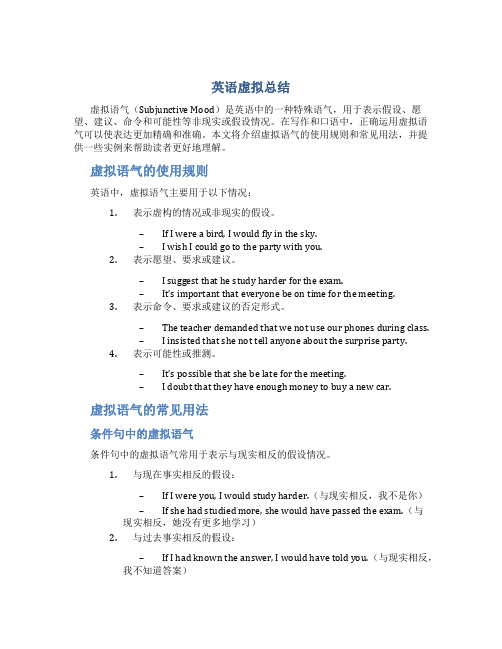
英语虚拟总结虚拟语气(Subjunctive Mood)是英语中的一种特殊语气,用于表示假设、愿望、建议、命令和可能性等非现实或假设情况。
在写作和口语中,正确运用虚拟语气可以使表达更加精确和准确。
本文将介绍虚拟语气的使用规则和常见用法,并提供一些实例来帮助读者更好地理解。
虚拟语气的使用规则英语中,虚拟语气主要用于以下情况:1.表示虚构的情况或非现实的假设。
–If I were a bird, I would fly in the sky.–I wish I could go to the party with you.2.表示愿望、要求或建议。
–I suggest that he study harder for the exam.–It’s important that everyone be on time for the meeting.3.表示命令、要求或建议的否定形式。
–The teacher demanded that we not use our phones during class.–I insisted that she not tell anyone about the surprise party.4.表示可能性或推测。
–It’s possible that she be late for the meeting.–I doubt that they have enough money to buy a new car.虚拟语气的常见用法条件句中的虚拟语气条件句中的虚拟语气常用于表示与现实相反的假设情况。
1.与现在事实相反的假设:–If I were you, I would study harder.(与现实相反,我不是你)–If she had studied more, she would have passed the exam.(与现实相反,她没有更多地学习)2.与过去事实相反的假设:–If I had known the answer, I would have told you.(与现实相反,我不知道答案)–If he had taken his umbrella, he wouldn’t have gotten wet.(与现实相反,他没有带伞)建议和命令中的虚拟语气虚拟语气在建议和命令中起到表示非真实情况的作用。
英语难点分析-虚拟语气的使用要点
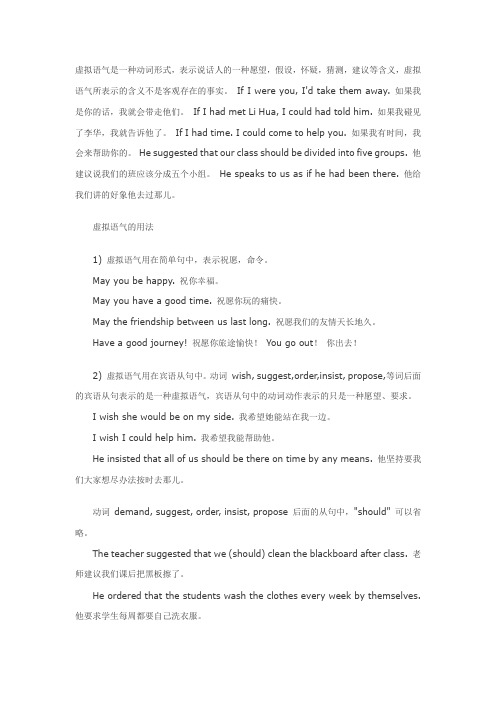
虚拟语气是一种动词形式,表示说话人的一种愿望,假设,怀疑,猜测,建议等含义,虚拟语气所表示的含义不是客观存在的事实。
If I were you, I'd take them away. 如果我是你的话,我就会带走他们。
If I had met Li Hua, I could had told him. 如果我碰见了李华,我就告诉他了。
If I had time. I could come to help you. 如果我有时间,我会来帮助你的。
He suggested that our class should be divided into five groups. 他建议说我们的班应该分成五个小组。
He speaks to us as if he had been there. 他给我们讲的好象他去过那儿。
虚拟语气的用法1) 虚拟语气用在简单句中,表示祝愿,命令。
May you be happy. 祝你幸福。
May you have a good time. 祝愿你玩的痛快。
May the friendship between us last long. 祝愿我们的友情天长地久。
Have a good journey! 祝愿你旅途愉快!You go out!你出去!2) 虚拟语气用在宾语从句中。
动词wish, suggest,order,insist, propose,等词后面的宾语从句表示的是一种虚拟语气,宾语从句中的动词动作表示的只是一种愿望、要求。
I wish she would be on my side. 我希望她能站在我一边。
I wish I could help him. 我希望我能帮助他。
He insisted that all of us should be there on time by any means. 他坚持要我们大家想尽办法按时去那儿。
动词demand, suggest, order, insist, propose 后面的从句中,"should" 可以省略。
- 1、下载文档前请自行甄别文档内容的完整性,平台不提供额外的编辑、内容补充、找答案等附加服务。
- 2、"仅部分预览"的文档,不可在线预览部分如存在完整性等问题,可反馈申请退款(可完整预览的文档不适用该条件!)。
- 3、如文档侵犯您的权益,请联系客服反馈,我们会尽快为您处理(人工客服工作时间:9:00-18:30)。
虚拟语气在商务英语中的应用张三指导教师:李四【摘要】本文为毕业论文。
内容主题是虚拟语气在商务英语中的应用。
本文以国际经贸发展的大环境为切入点,阐述了虚拟语气的定义和用法,结合商务英语的特征,举例说明了虚拟语气在商务英语中的应用,分析了虚拟语气的现实意义。
【关键词】虚拟语气;商务英语;礼貌表达The Application of Subjunctive Mood in Business English 【Abstract】The article is a graduation thesis. The topic is the application of subjunctive mood in Business English.This paper sets the development of international economy and trade tendency as a breakthrough point, elaborates the definition and usage of subjunctive mood mood, illustrate the application of subjunctive mood in Business English to link the stamp of subjunctive mood and analyzes the realistic meaning of subjunctive mood.【Key Words】subjunctive mood; Business English; business etiquette引言本人毕业论文课题是论虚拟语气在商务英语中的应用。
课题来源于商务英语中虚拟语气应用引发的相关问题的思考,结合商务英语的特点对虚拟语气的应用进行阐述。
商务英语是现代英语的一个重要组成部分,是国际商业社会的通用语言,它的发展趋势和主要特点在商务英语中得到充分的体现。
随着国际经贸的飞速发展以及世界的推移,商务英语越来越受到人们的重视。
商务涉及的面非常广泛,包括金融、投资、保险、财会、经营管理、市场营销、信息处理、对外经贸、合同和法律文书等,由于涉及到权利和义务的方方面面,商务英语语言严谨,词意准确;语法结构复杂,虚拟语气的运用十分广泛,不允许有半点纰漏。
在现代文明社会的国际贸易活动中能给合作伙伴留下温稳而雅、谈吐得体的印象是大多数商业人士所期待和希望的。
1.虚拟语气的定义及用法1.1 虚拟语气的定义语气是一种动词形式,表示说话人对某一行为或事情的看法或态度。
英语中有直陈语气,祈使语气和虚拟语气三种。
当if引导的条件状语从句所表达的内容不是事实或者是不可能发生的情况,而仅仅是一种愿望、建议、或者是与事实相反的假设时,称之为虚拟语气。
虚拟语气用来表示说话人的主观愿望或假想,而不表示客观存在的事实,所说的是一个条件,不一定是事实,或与事实相反。
虚拟语气通过谓语动词的特殊形式来表示。
eg:1.If I were free, I would go with you.如果我有时间,我会和你一起去的。
2.If I got rich, I would travel around the world.如果我有钱了,我将周游世界。
1.2 虚拟语气的用法在表示虚假的、与事实相反的或难以实现的情况时用虚拟语气,虚拟语气表示主观愿望或某种强烈情感时,也用虚拟语气。
即当一个人说话时欲强调其所说的话是基于自己的主观想法,而不是根据客观实际,就用虚拟语气。
虚拟语气常用在引导的非真实条件从句中,是用谓语动词的特殊形式来表示与现在过去事实相反的情况或对将来发生的情况表示怀疑。
1.2.1与现在事实相反的虚拟语气从句谓语动词用“should/would/could/might+动词原形”构成。
eg:(1)If I were you, I would help her.如果我是你的话,我会帮助她的。
(2)If there were no air or water, there would be no living things on the earth.如果没有空气和水的话,地球就不会有生命的存在。
1.2.2与过去事实相反的虚拟语气从句谓语动词由“had+过去分词”构成,主句谓语动词由“should/would/could /might+ have+过去分词”构成。
eg:(1)If I had visited the place before, I would have known the way.如果我以前去过那个地方,我就识路了。
(2)If he had taken my advice, he wouldn’t have madesuch a mistake.如果他听我的建议的话,就不会犯这样的错误了。
1.2.3对将来情况的主观推测虚拟语气还可用在对将来情况的主观推测,这种推测可能与事实相反或可能性很小。
从句谓语动词常见的三种构成方式:直接由过去式构成,由“should +动词原形构成”或由“were to + 动词原形构成”。
主句谓语动词由“would/should/could/might+动词原形构成”。
eg:(1)If you should be late tomorrow, we would not wait for you.万一你明天迟到,我们就不等你了。
(用should+动词原形表示一种偶然实现的可能)(2)If there were a heavy snow next Sunday, we wouldnot go skating.如果下星期天下大雪的话,我们就不去滑冰了。
(if从句中的谓语动词用过去式,表示说话人认为‘下雪’的可能性不大)(3)If it were to snow in summer,1 would believe you.夏天真下雪了,我就信你了。
(were to +动词的原形,表示实现的可能性很小,多用于书面语中)2.商务英语的特征商务英语是指人们在商务、贸易往来函电中使用的英语文体。
作为一种各体英语,它与英语的其他具体形式,如科技英语、新闻英语没有什么本质的区别。
除了一些经贸专用词汇的术语,商务英语同日常所用英语的词汇大多相同,它也没有自己独立的语法规则。
商务英语使用的是英语的基本词汇和语法规则,所不同的只是在英语的词汇系统及法规者的基础上有所改变,从而形成了某些独特的商务英语的语言风格特点。
2.1 商务英语的语言特征商务英语的语言正式、精炼,用词严谨、正规,词意准确商务英语所用语言比较正规,常有一定的格式和套话。
请看下面几个例子:(1)Your early reply to our specific inquiry will behighlv appreciated.如蒙早日答复我方的具体询价,将不胜感激。
这是外贸应用文中询价函电中常用的句型之一。
名词短语your early reply要比if youcan reply early正式精练得多,而被动语态will behighly appreciated 也是很正式的用语。
(2)Upon first presentation the buyer shall pay against document draft drawn by the seller at sight.The shipping documents are to be delivered against payment only.买方凭卖方开具的即期跟单汇票,于第一次见票时立即付款,付款后交单。
这是合同中有关即期付款交单的托收条款。
upon常用在合同、法律文书中表示“在......后立即,在......的时候”,如:upon examination... 经审查后......。
在条约、规章、法令等文件中shall表示义务或规定,其意思是“应、必须”。
eg:(1)The new regulation shall take efect on June 1st.新章程自6月1日起实施。
(2)We have received your letter of May 3,enquiring about the best terms ofthe goods.贵公司5月3日来函就该商品优惠条款的询盘已经收悉。
2.2 商务英语的文体特征商务英语内容缜密、周到,结构复杂、意思完整由于涉及到双方或几方面的利益,商务合同、文件或一个条约所给的定义、条款和内容必须精确。
为了做到准确无误,不产生任何差异,用英语拟订、书写这些文件、合同时,除用词恰当外,还会用许多从句、短语用来修饰或限定其内容,因此结构复杂、句子冗长,有时甚至显得有点臃肿。
eg:(1)Each Contracting State undertakes to provide for the adequate and efective protection of the rights of authors and other copyright proprietors in literary, scientific and artistic works, including writings, musical, dramatic and cinematographic works, and paintings, engravings and sculpture.各成员国承担对文学、科学及艺术作品(包括文字的、音乐的、戏剧的、电影的作品,以及绘画、雕刻与雕塑)的作者及其他版权所有者的权利提供充分、有效的保护。
(2)Inspection:It is mutually agreed that the Certificate of quality and quantity orweight issued by the manufacturer shall be part of the documents for payment under relevant L/C, However, the inspection of quality and quantitv or weight shall be made in accordance with the following.商品检验:双方同意以制造厂出具的品质及数量或重量证明书作为有关信用证项目下付款的单据之一。
但是,货物的品质及数量重量检验应按下列规定办理:......。
句子中that the Certificate of quality and quantity or weight issued by the manufacturer shall be part of the documents for payment under relevant L/C是主语从句, it是形式主语,It is mutually agreed用的是被动语态,意思相当于Both parties agreed... ,但前者比后者要正式。
